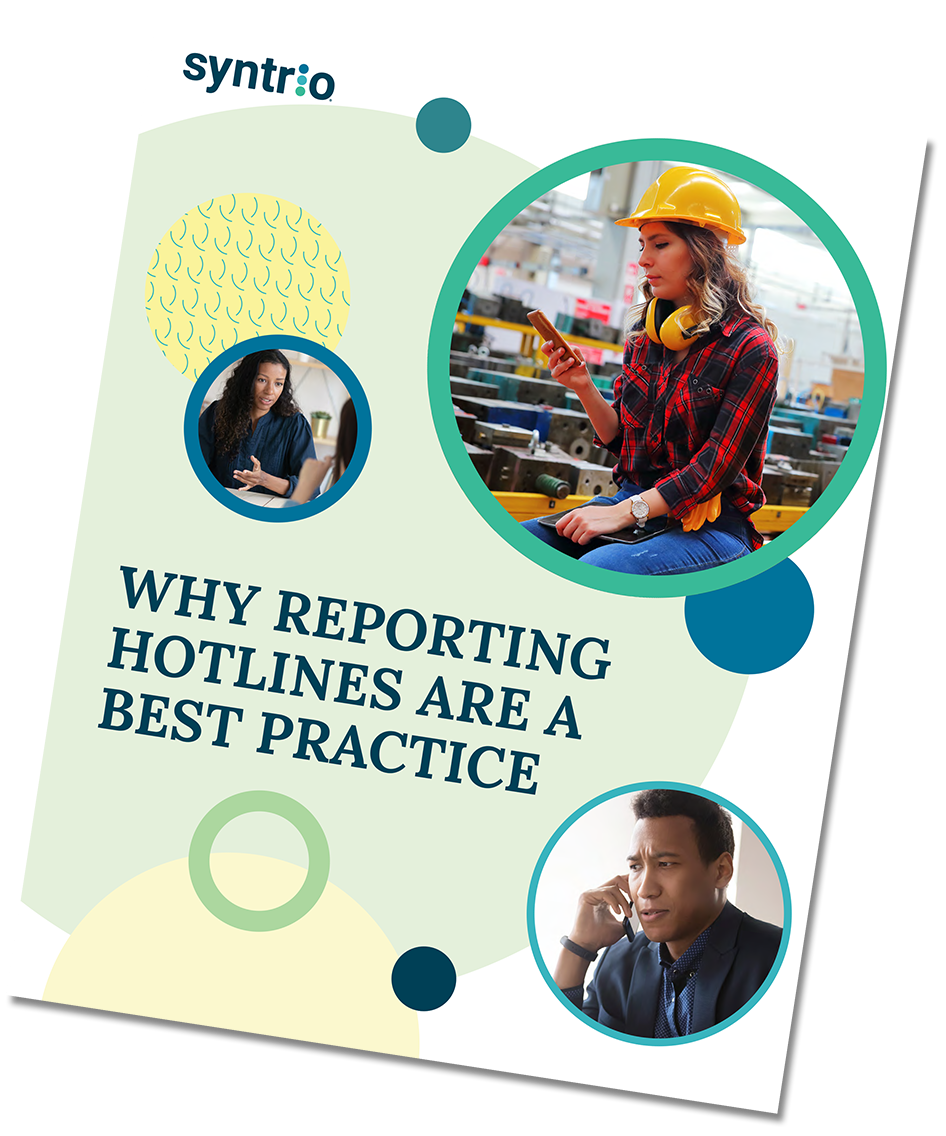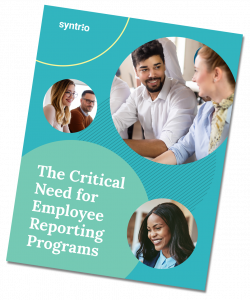POPULAR TOPICS – ETHICS HOTLINE
Why Whistleblower Hotlines are a Best Practice
See how Syntrio’s secure & confidential employee hotlines promote a Speak Up! and Listen Up! culture.

Whistleblower Hotlines Address the Workplace Misconduct That is Pervasive Across Industries
According to the first-ever Global Business Ethics Survey (GBES) generated by the Ethics Resource Center, 36 percent of workers in multinational companies indicated they had witnessed workplace misconduct in the previous 12 months. The survey suggests that lying and being abusive are the most commonly seen forms of misconduct in almost every country.
The GBES also points to change (merger, acquisition, management restructuring, etc.) as a significant factor regarding the rate of misconduct. Only 17 percent of survey respondents indicated they witnessed misconduct in organizations where no significant changes occurred. By comparison, the rate in organizations that underwent 1-3 or 4-7 substantive changes was 40 percent and 59 percent, respectively.
How are organizations detecting occurrences of misconduct? Using fraud as an example, the survey indicates that, by far, the most common way organizations see fraud is through anonymous tips received via ethics hotlines. According to the study, 43.5 percent of frauds in U.S. organizations with 100 or more employees were discovered through information. In comparison, only 18.6 percent were uncovered by internal audit and 12.7 percent by management review.
Get the Guide!
36%
of workers in multi-national companies witness workplace misconduct.
In the U.S., organizations with 100 or more employees
![]() of frauds discovered through tips
of frauds discovered through tips
of frauds uncovered by an internal audit![]()
![]() of frauds found by management review
of frauds found by management review

Industries
Anonymous hotline reporters work in various industries, including healthcare, not-for-profit, financial services, technology, manufacturing, professional services, education, biotechnology, retail, energy, entertainment, transportation, construction, government, real estate, insurance, manufacturing, hospitality, and agriculture.
Resistance to Speaking Up
Organizations with no anonymous reporting hotline are likelier to miss unethical behavior until it is too late. Additionally, a reporting hotline allows employees, witnesses, or victims to confidential and securely contact the appropriate authorities and report inappropriate activities such as discrimination, harassment, conflicts of interest, and time theft, to name a few.
According to the Association of Certified Fraud Examiners, the most common method of detecting fraud is through tips from whistleblower hotlines. Organizations with reporting hotlines are more likely to detect fraud through whistleblower tips than organizations without hotlines.
The most common way of discovering ethical misconduct is through tips. This is true for organizations, including government, private and public companies, and not-for-profit entities.
Interestingly, tips concerning ethics violations do not always come from employees. According to the AFCE study, most tips (51.5%) come from employees. However, customers, shareholders, competitors, and vendors generate many leads (31.9%). Finally, 14.0% of tips are anonymous.
Organizations that do not implement employee reporting hotlines also incur much higher median losses than those that use them. A previous study found that organizations without access to confidential reporting hotlines lost twice as much money as those with access to anonymous hotlines.

Standard Methods of Fraud Detection
![]() Ethics Hotline
Ethics Hotline
![]() Management Review
Management Review
![]() Internal Audit
Internal Audit
![]() Other
Other

The Call for Stronger Ethical Standards
Many organizations now encourage reporting inappropriate behavior as soon as it occurs to combat unethical practices and detect them in the early stages. An anonymous reporting hotline is a practical and reliable method used by organizations of all types.
Sarbanes-
Oxley
Compliance
Access to
Privacy
Confidentiality
and
Anonymity
Trained
Specialist
Proactive
Approach
Ensuring
Transparency
Incident Type
Screening
Expediency
HR Case
Management
Whistleblower
Protection
Saving Face
Cost Savings
Sarbanes-Oxley Compliance
Sarbanes-Oxley requires public companies to appoint independent audit committees to oversee the procedures for receiving and handling confidential whistleblower reports. Specifically, SOX Section 301 requires the implementation of systems for:
(A) The receipt, retention, and treatment of reports received by the issuer regarding accounting, internal accounting controls, or auditing matters.
(B) Issuer employees’ confidential, anonymous submission of concerns regarding questionable accounting or auditing matters.
A reporting hotline allows employees to report issues anonymously and confidentially, helping companies meet these criteria.
Access to Privacy
Employees who witness or experience unethical practices may be reluctant to whistleblow while at work, even if promised confidentiality. The possibilities exist:
- a phone call might be overheard,
- a sensitive email might be intercepted or
- The employee is seen entering or exiting the office of a human resources representative or ethics and compliance officer.
A reporting hotline can eliminate these concerns by allowing the employee to submit a report outside of the workplace. The employee can access the hotline 24 hours a day, seven days a week, and submit a message via alternative methods like fax, email, or the internet. Anyone can quickly report a claim outside regular working hours.
Confidentiality and Anonymity
Employees can report irregularities to a hotline staffed by an impartial third-party provider without revealing their identities. This is particularly important when reporting sensitive issues that may subject the reporter to discrimination or harassment. The ability to remain anonymous can also reduce the likelihood of retaliation against the reporter.


Trained Specialists
Human resources workers may not have the specialized knowledge to deal with ethical issues, but they can access trained professionals to help with these concerns.
In addition, these qualified specialists are typically required to pass background checks and agree to non-disclosure employment provisions. This gives the employee confidence that the person receiving the report is also of high moral and ethical character.
Proactive Approach
Hotlines can help employers control unethical behavior by reviewing how much money is lost and how long the misconduct lasts. If we don’t discover and stop corrupt practices early, they can continue for years. This is partly because no effective mechanism exists for employees to report their suspicions confidently.

Ensuring Transparency
A significant contributor to financial fraud is the lack of transparency in accounting practices. A reporting hotline can help prevent financial fraud and improve transparency. A hotline can also promote more transparent business practices, which can help reduce inappropriate acts such as bribery by overseas workers.
Incident Type Screening
Different ethical issues require additional handling depending on the organization. For example, some organizations may have their human resources department address specific issues, while others may require legal attention. A third-party reporting hotline can help ensure that reports are routed to the proper company representative and the ethics and compliance officer for final disposition, if applicable.
Expediency
The practicality of report handling is another example of how a reporting hotline constitutes best practices. Reporters must feel that their reports are handled and addressed promptly instead of stored in a desk drawer. A reputable third-party reporting hotline will process the information and prepare a report expeditiously, typically within minutes of receipt. The completed piece is then promptly forwarded to the designated representative within the organization.
HR Case Management
An effective hotline for larger organizations should include a Case Management System (CMS) to track and analyze reports. CMS allows the program administrator to keep track of incidents from receipt to resolution, including assigning them and creating reports and charts. This is helpful for investigations and understanding what happened.
Whistleblower Protection
Per SOX Section 806, whistleblowers are protected against retribution from management or other employees. They can file a report with the Secretary of Labor if they believe they have been discriminated against. Whistleblowers can also find additional protection from retaliation by using the confidential hotline.
Saving Face
Unethical practices can devastate an organization’s economy and damage its reputation. A data breach caused by employee misconduct or negligence can destroy a company’s good name and standing. Hotline reporting allows early detection of unethical practices, allowing the organization to take corrective measures before information becomes public.
Cost Savings
An ethics hotline is one of the easiest and most cost-effective internal control systems a corporation can implement. By outsourcing to a competent third-party ethics hotline provider, an organization reduces the need to hire its staff. It can also realize the savings that result from eliminating unethical practices.

Ensuring Awareness of Your Risks & Exposer has Never Been So Important!
Customers Choose Syntrio’s Anonymous Whistleblower Hotlines!
A reporting hotline is considered a best practice for any organization that wants to improve the ethics of its culture. The employee can submit a message via a toll-free hotline, fax, email, or the Internet. The AFCE calls fraud reporting methods such as hotlines a “critical component” of any fraud prevention system.
Reporting hotlines give employees access to an impartial third-party provider who can help them resolve issues quickly and effectively. Employers can use a Case Management System to manage hotline reports and enhance internal controls effectively.
Organizations currently satisfied with their level of ethical behavior may be experiencing a false sense of security. As this trend continues toward globalization, it can open the door for unethical practices unless a proactive approach is taken.
Organizations committed to best practices must not underestimate the importance of ethics in the workplace. A company can demonstrate its commitment to ethical behavior by implementing a third-party reporting hotline.

